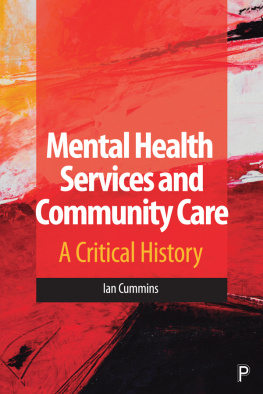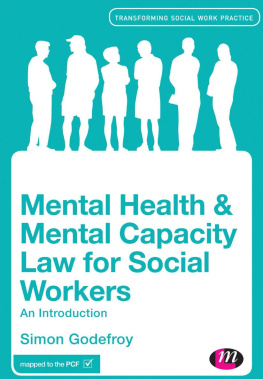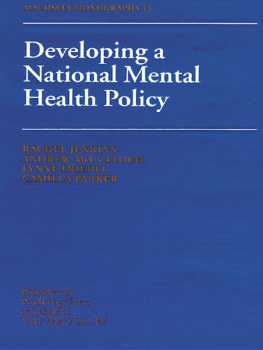Key Concepts in Mental Health
Key Concepts in Mental Health
Fourth Edition
SAGE Publications Ltd
1 Olivers Yard
55 City Road
London EC1Y 1SP
SAGE Publications Inc.
2455 Teller Road
Thousand Oaks, California 91320
SAGE Publications India Pvt Ltd
B 1/I 1 Mohan Cooperative Industrial Area
Mathura Road
New Delhi 110 044
SAGE Publications Asia-Pacific Pte Ltd
3 Church Street
#10-04 Samsung Hub
Singapore 049483
David Pilgrim 2017
First edition published 2005. Reprinted 2006, 2007 and 2008
Second edition published 2009. Reprinted 2010, 2011 and 2012
Third edition published 2014. Reprinted 2014 and 2015
This 4th edition first published 2017
Apart from any fair dealing for the purposes of research or private study, or criticism or review, as permitted under the Copyright, Designs and Patents Act, 1988, this publication may be reproduced, stored or transmitted in any form, or by any means, only with the prior permission in writing of the publishers, or in the case of reprographic reproduction, in accordance with the terms of licences issued by the Copyright Licensing Agency. Enquiries concerning reproduction outside those terms should be sent to the publishers.
Library of Congress Control Number: 2016946487
British Library Cataloguing in Publication data
A catalogue record for this book is available from the British Library
ISBN 978-1-4739-7300-8
ISBN 978-1-4739-7301-5 (pbk)
Editor: Becky Taylor
Assistant editor: Charlne Burin
Production editor: Katie Forsythe
Indexer: Elske Janssen
Marketing manager: Tamara Navaratnam
Cover design: Wendy Scott
Typeset by: C&M Digitals (P) Ltd, Chennai, India
Printed in the UK
Contents
About the Author
David Pilgrimis Honorary Professor of Health and Social Policy, University of Liverpool, and Visiting Professor of Clinical Psychology, University of Southampton. After training and working as a clinical psychologist, he completed a PhD examining psychotherapy in the organisational setting of the British NHS. He then went on to complete a Masters in sociology. He has worked at the boundary between clinical psychology and medical sociology for the past 20 years and has produced more than sixty articles based upon his research into mental health policy and practice that were published in peer-reviewed journals. His years working in the British NHS provided him with extensive everyday experience of the theoretical and policy aspects of mental health expressed in practical settings. One of his books,
A Sociology of Mental Health and Illness (3rd edn, Open University Press, 2005), co-authored with Anne Rogers, won the British Medical Associations Medical Book of the Year Award for 2006. Currently, he is writing a book on child sexual abuse and public policy.
Preface to the Fourth Edition
I am grateful for the opportunity to update this book. The feedback from colleagues at Sage about the strengths and weaknesses of the previous edition has been very helpful. New entries have been added in light of that feedback and adjustments have been made to some others in light of recent changes relevant to the subject outlined.
I want to repeat acknowledgments from earlier editions. I am particularly grateful to Anne Rogers for working with me since 1993 on editions of A Sociology of Mental Health and Illness, which has informed many entries here. I have also been helped in my editing task by conversations in recent years with Richard Bentall, Roy Bhaskar, Mary Boyle, Pat Bracken, Tim Carey, Jacqui Dillon, Chris Dowrick, Bill Fulford, John Hall, Dave Harper, Lucy Johnstone, Peter Kinderman, Eleanor Longden, Ann McCranie, Nick Manning, Joanna Moncrieff, Nimisha Patel, John Read, Helen Spandler, Nigel Thomas, Phil Thomas, Floris Tomasini and Ivo Vassilev. In the preface to the first edition of this book, I acknowledged an even longer list of helpers, who remain important here. As with the previous editions, any errors of omission or commission, which might be spotted in the coming pages by the reader, are my responsibility alone.
David Pilgrim
Part 1 Mental Health
Mental Health
Definition
Mental health is used positively to indicate a state of psychological wellbeing, negatively to indicate its opposite (as in mental health problems) or euphemistically to indicate facilities used by, or imposed upon, people with mental health problems (as in mental health services).
Key Points
- Three different uses of the phrase mental health are examined.
- Reasons for the use of mental health in preference to other terms, such as mental illness, are discussed.
Alternative connotations of the term mental health indicated in the above opening definition will be discussed below, in relation to positive mental health, mental health services and mental health problems.
- Mental health as a positive state of psychological wellbeing A sense of wellbeing is considered to be part of health according to the World Health Organization (WHO), which in 1951 described it as: the capacity of the individual to form harmonious relations with others and to participate in, or contribute constructively to, changes in his social or physical environment (WHO, 1951: 4). This has been built on over time (see entry on spiritual gift or a mental illness? Posing these sorts of questions highlights the impermanent dividing line between mental health and mental abnormality.
- Mental health as a prefix to describe one part of health services Since the Second World War, the term mental health services has now replaced that of psychiatric services (although the latter is still sometimes used). Prior to the Second World War, there were hospitals, clinics and asylums. These were either under parochial control, with a voluntary or charitable history, or they served a specialist regional or national function. At that time, though, they were not called services. As Webster (1988) notes, prior to the NHS in Britain, there was an admixture of charitable hospitals and medical relief offered to those in the workhouse system. This is why many of the older general hospitals were adapted poorhouse buildings. However, a major exception to this mixed picture was the network of dedicated mental illness and mental handicap hospitals which, since the Victorian period, had been funded and run by the state (Scull, 1979). The notion of a health service, post-1948, when the NHS was founded, reflects a shift towards a coherent system of organisation and a notion of a publicly available resource (at the service of the general population). Currently in Britain, most specialist mental health services are within the NHS. In addition, there are privately run mental health facilities. These vary from small nursing homes to large hospitals which receive NHS patients who cannot be accommodated by local NHS mental health services. With devolution in the UK, specific policies about mental health service organisation now vary from one country to another (Department of Health, 1998, 1999; Scottish Office, 1997; Welsh Assembly Government, 2002).
















